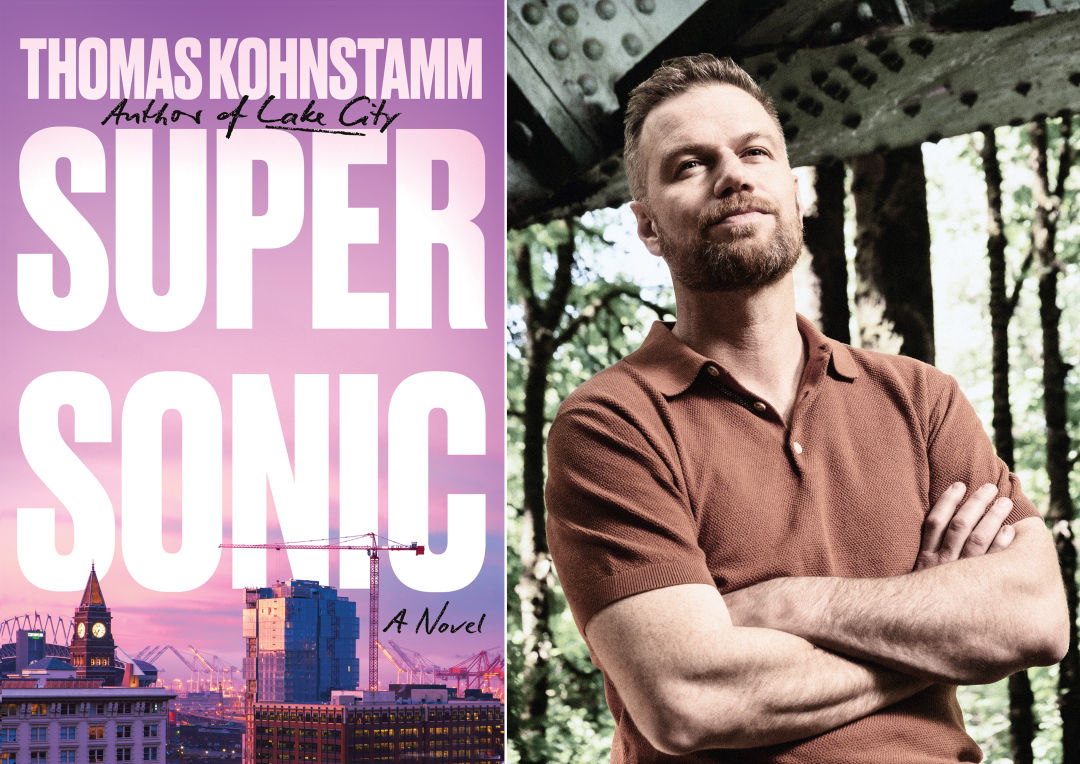Introducing Seattle Met's Very First Book Club

Welcome to the first ever Seattle Met book club. On May 20, we’ll be sitting down with author Thomas Kohnstamm at the University Book Store to discuss his newest novel, Supersonic. In the weeks to come, we’ll be sharing insight from Kohnstamm on the book—which is available at local stores— and related stories from the Seattle Met archives.
When the head of the Stevenson Elementary PTA proposed to rename the building in honor of its Japanese American heritage, she expected some resistance—but not at the level of the district shuttering the school altogether. Budget cuts. Declining enrollment. Another Seattle institution was on the chopping block. Instead of backing down, Sami Hasegawa-Stalworth and her ragtag PTA crew fought to rewrite the history of the school rather than let it be erased.
While that could be a news story from recent months, it’s actually a fictional storyline from of my new novel, Supersonic (published this year but written between 2020 and 2024). I never intended any ripped-from-the headlines plotting in the book. I was attempting to write an updated, wide-lensed creation myth for our city: one about hustlers and dreamers, about how this place is built on waves of speculation, disappointment, reinvention, and dogged optimism. But, in writing a novel based on that cyclical nature of the city’s booms and busts, the story ended up inadvertently forecasting a few of our latest challenges.
I structured the book around four historical periods of upheaval:
- 1890s – The Yukon Gold Rush, when the city sold itself as the singular portal to unimaginable wealth—no matter that the gold was actually thousands of miles away in Northern Canada.
- 1950s – Peak Jet Age, when we convinced ourselves that the unimpeded rise of American technology was just about to engineer the end of history.
- 1970s – The Boeing Bust, when the tide swept out, and Seattle was caught standing there, stark naked and shivering.
- 2010s – Amazon Achieves Liftoff (+ Legal Weed), when unimaginable wealth finally arrived, along with a host of unanticipated kicks to the groin.
The Supersonic title of the book comes not from the basketball team, but from the Boeing supersonic transport (SST) that serves as the central metaphor for the story. The SST was supposed to change our relationship with time and space (it would have flown from Seattle to Tokyo in the amount of time it currently takes to fly to Dallas) but never made a single flight and was never even built. In those days, Seattle was the biggest company town in America and the SST’s cancellation cratered the local economy for a generation. However, many argue that the engineering culture built around the SST laid the groundwork for the rise of Seattle’s later tech industry.

Local Books
Seattle Met Book Club
May 20, 5pm at University Book Store
Join the Seattle Met book club in person for a conversation with author Thomas Kohnstamm.
Ultimately, Supersonic is about reaching high, falling on your face, and not always getting what you want—but occasionally finding what you need. Seattle’s cycle of ambition and setback has, on occasion, rewarded us with transformative successes in restyling coffee, operating systems, and e-commerce. Yet, these cycles have also inevitably included their share of face-plants.
None of the book’s various storylines were deliberate predictions about Seattle’s near future. Rather, writing Supersonic taught me that this narrative is simply what emerges when you examine Seattle’s history and illustrate its repeating patterns. If the book feels eerily relevant, perhaps it’s because Seattle keeps revisiting its previous challenges—each time amplified by new technology and faster media cycles.
If history is any guide, we’re currently experiencing another moment along the cresting waves and deep troughs of our city’s ongoing story. Hopefully, the next time the tide recedes, we’ll at least remember our bathing suits.
Over the next few weeks, I’ll be back here at Seattle Met to discuss more relevant themes from the book. Stay tuned.



